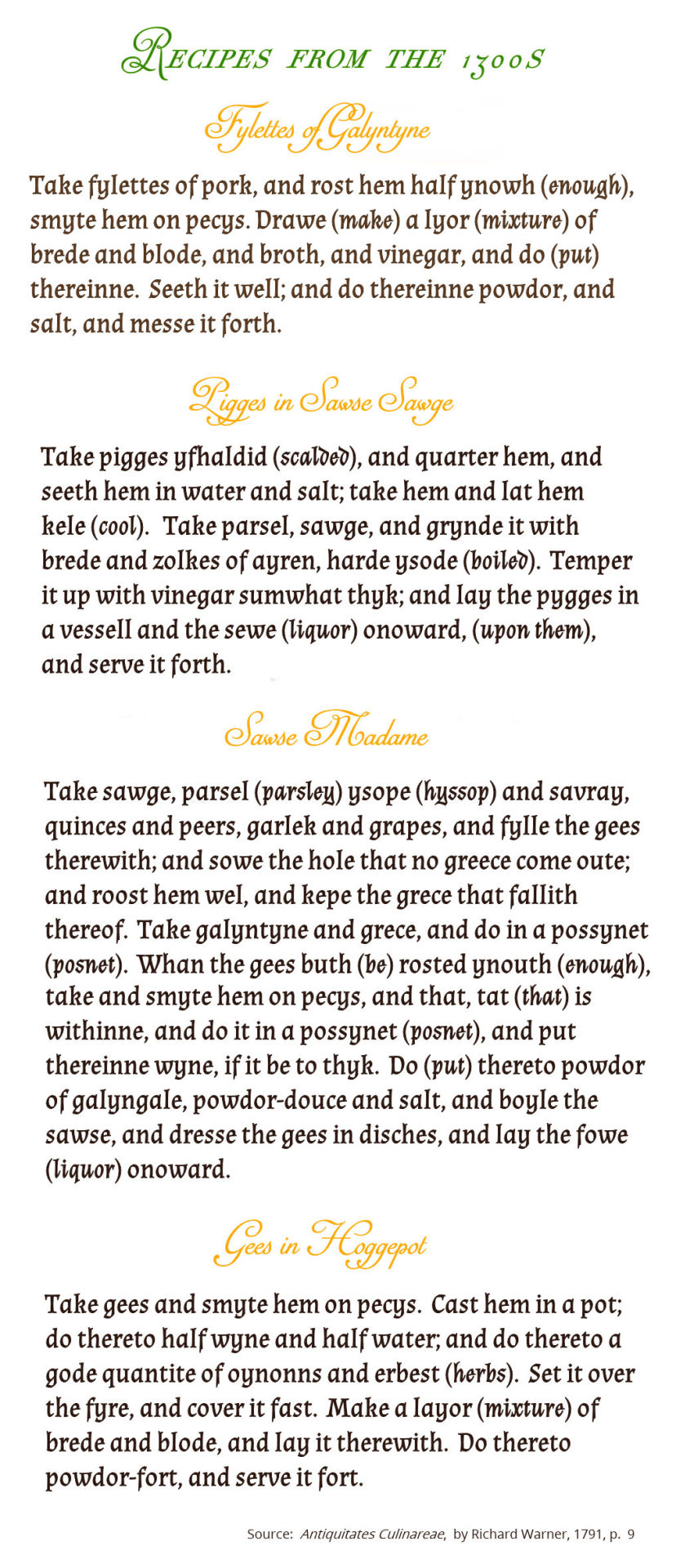Text
Lighting Fires Without Matches - The Medieval Way

The easy way to light fires in the Middle Ages was to keep a fire going that was already burning. When flame was needed elsewhere, flammable material could be use to transfer the flame to another location. Most people tended to keep their fires going as long as they could.
One of the most common methods of creating flame from scratch in the Middle Ages was through the use of natural flint, steel, and a material known as char cloth. The steel was known as the striker, and the flint was simply called the flint. These necessities were typically kept in a metal box. When traveling, men would carry their fire-starting tools in a small pouch deposited in the main purse tied at the waist, or in a separate pouch tied to their belt or cinch.
Char cloth is the abbreviated from the full words charcoal cloth; it is highly flammable. It was made by throwing a clean cloth (typically linen, cotton, or calico) into fire so that it would start burning. Once flaming, the cloth would be removed from the fire and suffocated to put the flame out. The charred edges were harvested from the material; the pieces would catch on fire with little difficulty. The char cloth was the initial tinder that could catch fire and be transferred to a bundle of tow to stoke the flame until it was ready to be used to light wood bits and dried natural forage used as fuel to start a fire.
To create the spark, the striker had to be brought down across the flint hard enough to sheer off tiny flakes of the metal. The sparks from the percussion were captured on the char cloth, which would burn like coal embers, and then the char cloth was transferred to a packet of tow. Once on the tow was lit, the burning material was blown by mouth into flame. The tow could then be used to light bigger tinder, typically the small bits of wood and flammable materials placed under a fire to get it going.
Middle Agers were experts at making fire this way.
1 note
·
View note
Photo









#autumn#Fall colors#fall leaves#fall gold#Fall#autumn leaves#autumn colors#autumn gold#autumm#salemoregon
21 notes
·
View notes
Photo










2 notes
·
View notes
Text
ADELAIDE AND OTTO (Part 4) A Mostly True Love Story
Someone called her name down the castle hall outside her room. Louder and louder the excited voice echoed through the hallway. The sounds of running footsteps stopped with a banging on her door. A loyal subject carried an arrow with a message tied to it. With trembling fingers she unfastened the paper. It was from Otto. He said that he was tied up in urgent affairs and had to remain behind in Germany. He was sending his son to rescue her. Adelaide’s heart raced. Otto hadn’t been defeated. It wasn’t him! The note said that he wanted to discuss her offer. She read and reread the message, but try as she might, she could ascertain no hidden meanings or affection. She consoled herself with the certainty that he would still come for her and that he was interested in her bargain. She would wait until then.
When Liuthold returned to his father’s court, Otto was furious. Not only had Lute disobeyed his orders but he’d lost the campaign. His men were superior in every way and they should have been able to handily bring Adelaide back to him. Instead, a good number of his finest were lost due to his son’s ineptitude.
Otto abruptly walked away from his urgent affairs of state, calling together a vast army that he headed up personally. He fought at their head like a glorious golden lion, spreading terror be-fore him. Word traveled ahead of his advance that Otto himself led his men, dispatching anyone in his path. His powerful forces paralyzed the Italians with fear and they surrendered in steadily increasing numbers as the German king moved deeper into Italy. By the time they arrived at the archbishop’s castle of Adelaide’s refuge, all resistance had ceased.
As desperately as Otto wanted to see Adelaide, he had one last thing to accomplish. He wanted first to retake the royal city from the usurpers so that he could return her legacy to her. This act, he hoped, would not only place her other suitors in an inferior light but soften her heart toward him. He had arrived prepared to handle any contingency involving Adelaide, determined to make no more miscalculations. With most of his forces he headed off for Pavia where 60,000 Italian troops waited to do battle with him. Those he left behind were commanded to find Adelaide and bring her to him in Pavia.
As he arrived at the fortress walls in Pavia, the Italians, disgusted with Berengarius and Willa, refused to follow the commands of their hated king and queen. They dropped their weapons, opened the gates to the City, and welcomed Otto, cheering him on as their conquering hero. Pavia was his without the loss of a single life.
Adelaide and her escort rode in to the deafening cheers of her subjects. Otto waited impatiently for her at the castle gate. She pulled her prancing mare to a halt. His eyes consumed her waif-like face and emaciated figure clothed in plain dress. Despite the horrors she’d suffered, strength and serenity shone through her enormous eyes. No one in the intervening years had measured up to the lovely young queen. She was the reason that he hadn’t remarried. He’d yearned for her and no one else could fill the void.
Adelaide’s breath deserted her at the sight of the golden, leonine man striding toward her like a bright, avenging angel, flanked on each side by men bearing an uncanny resemblance to him. No smile hovered on his lips, nothing to indicate his mood. He watched her gravely as he approached her mount. A knight in her escort dismounted and took her suddenly disquieted mare by the bit. If only Otto would give her some indication of what he was thinking. Instead, he studied her like one would a book, shadows chasing across his cerulean eyes. Was that regret she saw? Her heart plunged to her toes. Try as she might, she couldn’t divine his intentions. Hiding her embarrassment, she raised her chin higher, determined to see her way through the painful tableau of her creation.
A gentle smile tugged at the corners of Otto’s mouth. Without breaking eye contact, he gestured widely to the city and palace at his back and, in a loud voice, announced to the assembly that their lawful queen had returned to reclaim her kingdom. By his authority and the might of his armies, he would enforce her reign. The Italians erupted in joyous pandemonium.
The king reached up to a bemused and speechless Adelaide. Taking her by the waist, he lifted her up and off the horse as if she weighed no more than a feather. His eyes never left hers.
A raspy clearing of throat broke Otto’s concentration. With a start, he turned and introduced her to the men at his side, his two brothers. Henry, the Duke of Bavaria, had joined forces with his brother to fight for Adelaide. Bruno, the archbishop of Cologne, had accompanied them as well. Adelaide bowed slowly and gracefully before each man, straightening to kiss them on the cheek and thank them for their part in her rescue. Henry and Bruno were struck dumb. Over the back of her head, Otto grinned knowingly at his lugubrious brothers’ uncharacteristic lack for words.
Otto waited patiently. Adelaide took a deep breath, steeling herself. She turned and faced him. The deepest curtsy and show of respect she offered the king. She sank down to the ground on her knees and, taking his left hand, laid her cheek against the back of it. Tears tracked down her face as she thanked him for deliverance. Then, with head down as if in offering, she whispered brokenly that she was Otto’s to do with as he pleased, now and forever.
Overcome, the great king raised Adelaide to her feet. Hands gripping the curve of her waist, he dropped to one knee in the dirt; and, in front of all the people, humbly asked Adelaide to marry him. Forgetting their audience, Adelaide leaned over to place gentle kisses on his forehead and cheeks. Her tears of joy splashed on his handsome, upturned face as she hiccupped and gasped, struggling to pull air into her lungs. His beloved Adelaide had finally lost her celebrated poise. The big king rose to his full height, crushing Adelaide in his mighty arms. He whirled her around; and, setting her back on the ground, unceremoniously kissed her in front of the world. His long wait for her had ended.
Otto signalled his brother, the archbishop to come forward. Bruno performed the marriage ceremony there in the outdoor courtyard with the King’s army and the city’s inhabitants as wit-nesses. The people shared in the festivities, happy for their beloved queen, and thrilled to be delivered at last from the cruel tyranny of King Berengarius and Queen Willa.
King Otto freed King Berengarius and Willa on the condition that they abandon their wickedness. If they did not, he told them that he would come for them and harsh justice would be swiftly dealt to them.
Within the year, Liuthold formed a conspiracy with two dukes—one of whom was his sister’s husband. The three captured Otto, wresting egregious concessions and partitions of land. The enterprising Otto escaped without assistance. He called his army together and, with the aid of his brother Henry, chased the three men down. He nullified his agreement with the three dukes, because, as he said, an agreement coerced by force was no agreement at all. As was his habit, he was lenient, only stripping the guilty parties of their titles and holdings.
Liuthold lost his standing in the royal family and his right to succeed his father as king of Germany, as well as the dukedom to Suabia; Otto’s son-in-law died bravely in battle trying to redeem himself for his disloyalty to Otto; and nothing was heard of the third duke again.
Soon thereafter, the Papacy struck a deal with King Otto to make him Holy Roman Emperor. King Otto controlled a vast amount of Europe. The Papacy had no control over Germany’s revenues and taxation. Concerned over the breadth and scope of Otto’s control and the accumulation of taxes that the Pope felt belonged to the holy see, the title of Holy Roman Emperor was dangled in front of Otto as bait. Otto took the bait, but pulled the Papacy in the lake and drowned it. He was no puppet to be controlled by the Papacy. He controlled the papacy and insisted on appointing his own bishops to ensure the integrity of the church. He would not allow the church to impose unjust taxation on his kingdom.
The Pope turned on Otto, appointing a new emperor. Otto chased the new emperor off and appointed a new Pope. He then convened an assembly of nobles and bishops to confirm his appointment and defrock the corrupt pope. The confirmation was made and the former Pope fled. Never had the church been treated with such impunity.
Although Emperor Otto’s empire may not have been as large and sweeping as Charlemagne’s, he was more powerful because of his independence and insistence on separation of church and state.
Before long, word reached Emperor Otto that Berengarius and Willa were again terrorizing their subjects. Troops were dispatched and pair was recaptured.
Otto brought the former queen in shackles to Empress Adelaide for judgment. Adelaide was now the most powerful woman in the world. When Adelaide mildly remonstrated with the captive for her crimes, the former queen spat, "The only crime with which I reproach myself is that I didn’t kill you when I had you in my power." Adelaide rose and walked down to the unrepentant creature. She gently unshackled the woman, demonstrating no fear of someone who had nearly destroyed her. Then she signalled the guard to return the prisoner to her husband.
At Otto’s command, the former king and queen were transferred to an unknown location. Berengarius and Willa died in jail. No one marked the date and time of their passing and no one mourned them. Adalbert, their son lost his fortune and holdings as a result of incompetence. Adelaide asked for and received custody of his two daughters. She adopted them and raised them as her own.
Together, Otto and Adelaide had five children. They built churches and monasteries; they were dedicated patrons of the arts. They issued laws in the interest of their people and passed down decrees to protect them. They were benevolent and kind; their judgments were fair and merciful. When the celebrated pair died, their subjects grieved deeply.
0 notes
Text
ADELAIDE AND OTTO (Part 3) A Mostly True Medieval Love Story
Over the course of Adelaide’s marriage, her father had passed away and her mother had remarried Lothaire’s father. She was appalled. Her father-in-law, and now stepfather, was a man of poor moral fiber and had been her father’s enemy for years. Her mother and she had grown apart as a result. Adelaide answered to no one; she was her own person, and could do as she pleased. If she married again, it would be her choice; never again would she be a political pawn. Her years as a gamepiece for powerful men were over. She was free to make her own way.
At Berengarius’s insistence, Adelaide met with self-proclaimed king and his son, Adalbert. The two men tried to force Adelaide into a marriage agreement. Horrified, the spirited young widow told them that she would only marry someone who could avenge husband’s murder. She fled their presence.
Returning to her royal city of Pavia, Adelaide gathered her loyal knights and subjects together, fortifying her castle walls against an attack from the Italian kings. The kings came. Adelaide and her people ran out of food and supplies. Her forces fought heroically. Adelaide shared her royal provisions with her people until those, too, were gone. A traitor opened the castle gates. Before she even knew that her castle had fallen, the two kings stood in front of her. They carried her off to the royal residence and there held her captive. At first, Berengarius and his queen Willa treated her well even though she was a house prisoner, but, Adelaide resisted their overtures. She would not give in to their demands, preferring to face death rather than marry the prince.
Willa, known for her viciousness, resorted to torture and violence. The queen threw Adelaide in prison. It is said that she dragged Adelaide by the hair to the castle keep. There, Willa visited Adelaide daily, slapping, punching, and kicking her, hurling vile insults at her. The queen often beat her with a stick. No one knows what other abuses Adelaide was most likely subjected to. The young widow resisted every coercion, even though she knew that, by so doing, she condemned herself to death. Such was her loyalty to Lothaire and her strength of character. She bore her circumstances without complaint or bitterness.
Finally, infuriated beyond all rationality, the queen transferred Adelaide to another dungeon in the neighboring town of Garda where Adelaide was to be abandoned and starved to death. Berengarius confiscated her royal fortune. Only her Burgundy estates, which were outside Berengarius’s influence, remained.
Word reached Otto’s ears months earlier that Adelaide was widowed. Hindsight told him that he should have immediately swept her up and taken her to his palace, allowing her to grieve there. Instead, he had waited, exercising his considerable self-control in order to give her time to grieve a husband that by all appearances she adored. While he bided his time, Adelaide vanished. She should have been his by now. His strategy had backfired on him yet again.
Losing Adelaide was the only battle Otto had ever lost. He’d bitterly chafed against the bad timing. Their universes had collided four years ago. Had his wife died before Adelaide’s mar-riage and not six months after, he would have carried Adelaide off and held her captive until he could prevail on her parents to consider him a better choice and to break their agreement with Lothaire’s parents. He had hoped to win Adelaide’s heart while he negotiated with the King and Queen of Burgundy and then marry the princess after a suitable period of mourning had passed.
To his extreme annoyance, Conrad proudly regaled him with stories of dozens of offers that had been made for his sister’s newly available hand in marriage. Irking him even more were the offers made to Adelaide behind his back by his son and his brother, Henry. Henry had been quite repentant after his rebellion and Otto, convinced of his sincerity, reinstated Henry as Duke of Bavaria. But neither man had asked Otto for permission to make an offer to Adelaide nor had they told him they were going to do it. As their king, Otto approved or denied proposed marriage alliances. His nobles and family were subject to his dictates on their marriages. Most troubling was their possible hidden agendas and disregard for his authority. Obviously, they suspected where Otto’s feelings lay or they wouldn’t have tried to go behind his back.
He knew of Berengarius and his family’s misrule, their excesses and cruelty toward their subjects. He’d interrogated them personally, but they denied any knowledge of Adelaide’s whereabouts. He’d planted spies in Pavia, but, until he heard differently, it was a dead end. He was left to believe that Adelaide had gone into seclusion at an undisclosed location to mourn a husband she cherished. When she reappeared, he would claim her. If she were betrothed or married, he would still claim her. If he had to stoop to kidnapping, it wouldn’t be unheard of. He would go to any lengths to make Adelaide his.
Adelaide grew thinner by the day; her clothes torn and filthy; her hands and fingers shredded by attempts to claw a way out of the dungeon. She had been in captivity for four months; no one knew where she was; and she was slowly dying of starvation.
A devoted chaplain and maidservant were allowed to attend Adelaide. Stricken by Adelaide's circumstances, Martin, the chaplain, secretly arranged sanctuary with Adelaide’s Uncle Azzo, a neighboring archbishop, if she could but escape. He laboriously dug an underground passage to the dungeon and through the wall. Finally, he broke through. Adelaide and her maidservant stoically waited for him. He brought food and men’s clothes for the young women. They crawled out and carefully stole away unseen in the night.
When morning dawned, their escape was discovered. Berenger and Willa were even more determined to kill the young queen and sent out dogs and bands of soldiers to recapture her.
The land was riddled with bogs and swamps. The trio slogged through waterways, not using paths or trails. They left no tracks and the dogs couldn’t follow their scents far. Frequently, they lay in deep water in the marshes to evade detection. Once, the king’s troops came within a dozen yards. Another time, the trio barely made it to safety before soldiers burst upon them in a meadow. Every moment of their flight was harrowing.
After four days, Adelaide and her two companions arrived at the arranged upon asylum site, muddy, torn, hungry, and exhausted. The archbishop fed and clothed them and took them in. He was a strong noble, with many men and a huge, reinforced castle. He would be able to hold off the King’s forces indefinitely if Adelaide’s presence were discovered.
It didn’t take long before news of Adelaide’s whereabouts reached King Berenger and Queen Willa. With a large force, they laid siege to the castle. Adelaide despaired for her life and the lives of those around her. Archbishop Azzo’s castle was impregnable. Day after day, Italian soldiers assailed the castle, making no headway. Ultimately convinced that the stronghold’s inhabitants could withstand a siege for years, Berengarius and Willa withdrew their troops. They sent spies out to watch for Adelaide’s comings and goings, hoping to catch her unaware and recapture her.
Adelaide now found herself to be a captive of a different sort. If she left the fortress, Berenger and Willa would find her. She had nowhere safe to go and no protector other than the arch-bishop. Her only option was to remain safely at the castle.
One night, Adelaide dreamed of a huge, golden-haired warrior with shining blue eyes. He hacked his way through armies to reach her. His magnificent stallion charged to the right and left; his sword arcing and flashing as he cut down one fighter after another, shouting orders to the men following him. He was unstoppable. He hewed his way through the enemy like a wrecking machine. She woke, heart pounding, short of breath.
Otto had not remarried since his wife had died. He had thrown himself into the continued expansion of his kingdom. He reigned over the largest area of any king since Charlemagne. No one could withstand him. Yet he was not an invader like so many were. He only moved against countries who openly provoked him with hostile actions and had unstable governments. He had the largest military in the world. Known as “The Lion”, there was no other man powerful enough to take on the kings of Italy. Would he come?
Adelaide was Italy’s legitimate queen and whomever she married would become king. This was reason enough for Berengarius and Willa to do away with Adelaide. Otto may no longer be interested in her, but he would most certainly want to add Italy to his collection of domains.
Audaciously, Adelaide wrote a letter to Otto in which she told him of the hopelessness of her circumstances. She beseeched him to come to her aid. As a reward, she would marry him. In that way, Italy would be his and he would have access to her vast fortune. It could be a marriage in name only if he wished, but, regardless, everyone’s needs and wishes would be met.
Adelaide’s letter came as a surprise to Otto. His outrage knew no bounds when he learned of her situation. He resolved to move immediately against Berengarius and Willa.
Once again, the timing couldn’t have been worse. The German king was involved in critical matters of state. Unable to leave, he prepared a message to Adelaide. He asked her not to entertain any other offers until she first heard his. He said that he would put all his forces toward rescuing her and seeing to her safety. He wanted her to know that he was on his way and to have heart. He sent Liuthold, along with a strong contingent of his best troops to rescue Adelaide, give her the message, and bring her to him.
Liuthold, however, had his own agenda. He would free the beautiful Adelaide and she would know that he was her savior, not his father. He’d have Adelaide in his custody and she’d be so grateful that she would marry him. He would become King of Italy, no longer under his father’s thumb. When he returned to Germany with Otto’s troops, the nagging, little domestic matter of Adelaide would be settled. Adelaide would be his wife and there was nothing his father could do about it.
He struck out for Italy without waiting for instructions from Otto. When he arrived in Italy, the forces besieging Adelaide overwhelmed him. He was not the brilliant military strategist that his father was. As his troops were put to flight in a humiliating defeat, Liuthold handed over his father’s message to the best archer in his contingent, the leader of the knights. The knight fastened the message to an arrow and shot it over the fortress walls.
Adelaide heard the battle shouts and clang of metal on metal from her quiet room. The fighting had been fairly short. Her hopes were dashed as she heard the shouts of victory from the Italian defenders. The Germans had been routed. Otto had failed. He’d been defeated. Her heart hurt in more ways than she could count. She didn’t know what had gone wrong, but it was over. She’d run out of time.
She could either give herself up to King Berengarius and hopefully spare the rest of the lives at the garrison or remain at the fortress and be responsible for more loss of life. Regardless of what she did, Berengarius would most likely murder everyone in the castle for their part in defending her. There was no time to pen an offer to anyone else even if there had been anyone strong enough to rescue her. Sobs wracked her slender frame.
0 notes
Text
ADELAIDE AND OTTO - Part 2 A Mostly True Medieval Love Story
Thus commenced a complex dance of advances and retreats. After his initial success or two, Otto had to work harder for each victory he gained. For every advantage he won, she’d hand him his hat the next time. If she found that a tactic failed once, she simply discarded it and called up a new, more inventive way to accomplish her ends. If only he knew what her ends were. Otto was amused at the ingenious array of skills at her command. She changed up her techniques like a chameleon changes colors. It was a tantalizing game of cat and mouse.
When Otto could take a break from his official obligations, he informally joined Adelaide and Conrad on their outings and picnics as their host. Adelaide’s reticence in the king’s presence slowly slipped away as he lured her into his and Conrad’s easy exchanges. She loved debating philosophy and governing strategies; but never did she say a word about herself.
Oddly, the queen was mostly absent. She seemed to spend a lot of time in her rooms. Her rare appearances were short, but congenial. When Adelaide proposed that she spend some time with the queen, the suggestion was casually turned aside with a vague excuse that she was busy with her private affairs.
Sometimes, the king’s musicians performed in the evenings. Other times, the swordsmen and knights would put on displays. There were nights that magicians and clowns provided the entertainment. Chess and whist were after dinner pastimes. Frequently, Adelaide and Conrad joined in the games and after dinner conversations. Otto split his attentions between his inner circle and Conrad and Adelaide, raising no suspicions in anyone’s minds about his interest in Adelaide. From time to time, Conrad would excuse himself to perform some official duty and the king would take it upon himself to see that she was entertained. Often, they spent quiet time playing chess or discussing politics.
Inexorably, the king chipped away at Adelaide’s reserve; he charmed her with thoughtfulness and regaled her with stories of his misdeeds as a young man. Adelaide was drawn deeper and deeper into the carefully camouflaged trap of a brilliant and patient mastermind. There were quiet whispers in the dark while watching plays and exhibitions, innocuous touches that lasted a second too long, eyes that held hers when no one else saw; and accidental collisions up against each other. Adelaide was constantly churned up on the inside. She felt an unspoken subtext whenever she was in the king’s presence; she couldn’t tell if the feeling was internally based or of external origin. She walked a dangerous line where Otto was concerned. Stuffing her emotions far down inside her was a constant battle. Better to stay away from the man than make a foolish error.
Adelaide realized that Lothaire, to whom she until recently looked forward to marrying, was untried, a blank sheet of paper whose story was yet to be written. On the other hand, Otto was a man of heroic proportion, forged in the smelter of war and refined in worldly experience. Magnetic, charismatic, he eclipsed everything in his path. He had yet to reach the zenith of his greatness, but his history dictated that his future would be epic. She was helplessly drawn in to his irresistible allure. His smile curled her toes. For the first time in her young life, she desperately wanted something she couldn’t have. She never lost sight that he was married and she was soon to be. It was her shield. Regret ate away at her.
So, she used every skill she had developed over time to stay away from the king. Her heart beat too erratically when he was near. Recently, she found that many of her ploys were ineffective and she didn’t know why. She only knew that she was ineffectual. Conrad was her anchor and her safety zone. Adelaide resorted to accompanying him in his few official duties to avoid being found alone.
In her third week at the palace, Conrad was unexpectedly sent off on a day trip to another of the king’s estates to handle some pressing business. Adelaide returned from the stables and was summoned to the king’s private offices. Her smile quickly transformed into surprise when the king rose, walked to her, taking her by the arms with purpose. A political disaster in Bavaria required his immediate departure and he wouldn’t return for weeks, probably months. His brother Henry, leading a great number of nobles, had revolted and planned to rule an independent Bavaria. Otto would be gone for the remainder of her stay in order to put an end to the rebellion.
Hypnotized by his intensity, Adelaide was incapable of looking away. Her heart lurched painfully. Gone. She wouldn’t see him again. Conditioned to his harmless touches, Adelaide stilled. Mistaking her pained silence for the poise he found so irritating, Otto reeled her into his arms. Still, she didn’t react. Her inner shock and turmoil were too great. He was leaving--saying goodbye. She didn’t know which was more distressing—his aggressive behavior or his unexpected departure.
Frustrated with her lack of response, Otto brushed her hair back, holding her face in his big hands. He lowered his lips to hers. Staggered, Adelaide remained motionless. Pain ripped through her, crippling in its intensity. Off balance by her otherworldly stillness, Otto cupped her face in his palms and forced her to look at him. He would not leave his wife because he loved the queen and he could not shame her. She was the love of his youth. But he was a grown man now; and he was helplessly drawn to Adelaide. He believed Adelaide felt the same way about him. They were well matched and he wanted an indefinite liaison with the Burgundian princess that would benefit them both.
Otto tried to persuade Adelaide to break off her betrothal. He would pay off Lothaire’s family handsomely. Burgundy wasn’t strong enough to do battle with him and he’d be able to soothe any ruffled feathers. He laid it all out, the benefits, the details, all that she could expect. He would iron out the obstacles and take care of the details with her parents. Otto made a fine presentation as far as a legal brief was concerned.
Adelaide’s heart twisted, her sensibilities taking over. She pushed out of Otto’s hold. She reminded him that he was married and that she, likewise, was soon to be married. She couldn’t and wouldn’t dishonor or humiliate her affianced; nor would she ever enter into a scandalous relationship. She would not shame her family or dishonor his wife. She backed away. Otto followed, crowding her up against the wall.
The German king was desperate. He was trapped in a mire of his own making. The ambush he’d set for Adelaide, he’d fallen into. He’d unexpectedly run out of time and he was losing ground with every second. Adelaide’s sense of duty was formidable; he had to find a way to rock her world as his had been.
If she wouldn’t agree to a liaison, then, he asked Adelaide to wait for him. Adelaide could only reply that she was honor bound to keep her parents’ bargain.
He asked Adelaide if she would at least allow him the opportunity to try to change her mind. Would she voluntarily kiss him as a lover might? If she could walk away from it, he would let her go. It could do no harm, he said.
Adelaide consented. She wanted this one moment to cherish for the rest of her life. Otto pulled her arms up around his neck and drew her into his body. In the space of a heartbeat as his lips took hers, Adelaide realized his lie. It wasn’t harmless; it was lethal. Pandora’s box was open; its contents spilled out. She was lost, captivated by the feel of him. Returning his kiss blindly, she pressed her body into his. Her fingers tangled in his silken hair, imprisoning him in the kiss even as he held her prisoner. He scorched her with his desire. Adelaide found the strength to break the kiss. Trapped in his arms as she was, they searched each other’s eyes for something the other could not give.
Otto dropped his forehead against hers. He told her that if young Lothaire could make her blood boil the way Otto did, she should never look back. But if Lothaire couldn’t, Otto would be waiting for her. He released her and walked out of the room without looking back. Adelaide was destroyed. Her composure shattered for the first time in her life.
She kept these things a secret from Conrad. Outside the confines of her heart, she couldn’t give voice to what had happened with the King. To do so would be betrayal. When Conrad questioned his sister about her sadness, she simply told him that she dreaded leaving him so soon.
Six months later, Adelaide dutifully married Lothaire and learned that her blood, indeed, did not boil for the young man. They were, however, well matched. They became good friends and Adelaide was a loyal and loving companion to her husband. By the end of her first year of marriage, she had given birth to her first child. She had everything a woman could want. She was fabulously wealthy. She was the queen of Italy. Her husband was a handsome young king who loved her. She was adored by her subjects.
Then a letter came from her brother. Otto’s queen had died. Otto was free to marry. It wasn’t until after Eadgyth’s death that Otto explained the queen had been failing for years. Suddenly, his request of Adelaide to wait took on new meaning. Everything that she had blocked away over the years came roaring back. Pain crippled her at the realization of what could have been but would never be.
Ever compassionate, Adelaide composed a message to Otto relaying her condolences for his loss. She received no response.
Two more years passed. Lothaire had a quick, bright mind and showed great promise of becoming an outstanding king. He, too, was fair and just. In a short time, he had consolidated a number of Italian duchies into one rule. His had a vision and was executing it brilliantly. He was in close alliance with his rival King Berengarius of Ivrea. Adelaide didn’t like or trust Berengarius. Her skin wanted to crawl off her body when he was around. He treated his subjects unfairly, overly taxed them, and abused them. Berenger and his queen Willa and their son Adalbert seemed to have no moral compass, unless it was an immoral one.
One day, succumbing to their avarice for Italy and wanting the young queen to marry his son, Berengarius fatally poisoned King Lothaire. Berengarius and Willa declared themselves the new regents of Italy.
At the tender age of 19, Adelaide was a widow. Marriage offers poured in within weeks, but none came from King Otto, who was, by this time, the most important and powerful king in Europe. Shockingly, she received requests for her hand from two unwelcome sources--Liuthold and Otto’s brother Henry. Adelaide was crushed. They wouldn’t have made marriage proposals unless Otto approved. A dalliance was all Otto had wanted. He’d never been serious about her, while she . . . she had treasured a forbidden love tightly locked inside her breast believing that he was a shining god. She had been unfaithful to Lothaire in her heart and now she was stricken with remorse.
0 notes
Text
ADELAIDE AND OTTO (Part 1) A Mostly True Medieval Love Story
As the duchess of Burgundy and daughter of the king of Burgundy, Adelaide, was the richest woman in Europe. She was an intelligent, honorable, and breathtaking beauty, full of grace and confidence. When she was two years old, Adelaide was promised in marriage to Lothaire, the son of an Italian house rival to her family’s claim on the throne of Italy. Her parents and Lothaire’s parents were eager for the marriage because they hoped it would bring about peace between their two powerful families.
So it was that from childhood, the princess was groomed by her parents to be Lothaire’s wife. Adelaide’s father received regular updates on Lothaire’s development and activities. In turn, her father sent back reports on Adelaide’s development. As they grew up, the two children came to know each other in spite of never having met. Adelaide dreamed of the handsome young man as she eagerly awaited the day of her marriage. She blossomed into a stunning woman and, in spite of her betrothal, an endless stream of offers for the young girl’s hand in marriage were submitted to her parents. The king and queen of Burgundy would not entertain the idea of any other suitor.
Adelaide and her brother Conrad were best friends, thick as little thieves. When not in studies, they were carefree and mischievous children. They played, chased each other and wrestled, fished, swam, rode horses, and shared their dreams and hopes with each other.
Like Adelaide, Conrad had a royal imperative to fulfill—he was destined to be the successor to the throne of Burgundy. One day, their father announced that Conrad was going to Germany to foster under King Otto. It was a great honor that a king so powerful and noble was willing to take Conrad under his tutelage. No sooner was the announcement made, than Adelaide’s beloved brother was packed up and sent across the world. King Otto was legendary since, for the first time in history, he had united all the great duchies of Germany under one government. Not only was the entirety of Germany under his control, but he had also subdued troublesome Austria, Bavaria, and Suabia and put them under his rulership in order to quell their raids on Germany.
Adelaide was heartbroken, all alone in an adult’s world, the remaining bits of her childhood gone. Most of her waking hours were filled with learning royal etiquette, languages, reading, the sciences, arts, and mathematics. The princess excelled at her studies; to her natural beauty and poise, she added graciousness, compassion, and kindness.
Adelaide missed Conrad fiercely, writing letters daily. Conrad, in turn, regaled her with his activities, difficult affairs of state, the fine nuances of royal life, and training as a military commander.
Adelaide begged her parents to visit Conrad. She was sixteen and would be married soon. Once she became the queen of Italy, she might never see her beloved brother again. A time was arranged with the German king and Adelaide was sent off with full royal escort.
Conrad rode out the gates and met her at a distance from the royal palace, so overjoyed was he to see his sister again. Their reunion filled Adelaide’s heart with bliss. Oh, how she had missed him! Conrad told her that the German king had released him from most of his obligations during Adelaide’s visit so that they could spend every moment together. She would be staying an entire month. They laughed and teased each other, sharing all their hopes and dreams once again.
That night they were served at the King’s table. To honor her presence, the King’s closest counselors, captain of the guard, and his noble and most trusted knights attended. Adelaide charmed the assembly with her dignity, sparkling wit, and striking loveliness. Jostling for her attention threatened to separate her from Conrad. It was only with the greatest difficulty that she stayed by his side.
A hush gradually blanketed the room. Adelaide looked up to search out the cause. The king and queen had entered the room unannounced. Those who had seen them bowed deeply. The king, who surely must be Otto, stood a full head taller than anyone in the room. Dark blue eyes shining like the stars at twilight caught and held hers. Her heart stopped beating, air sucked from her lungs. All thought fled. An unnatural quiet filled her ears.
From a child, she had been schooled to stifle her emotions with a gentle reserve. Her parents said it would shield her from showing people her thoughts and give her an advantage. Without thought, she called upon that schooling now even as the compelling blue gaze held hers.
The golden-haired giant smiled, eyes crinkling at the corners; and, with his queen’s hand on his arm, the royal couple moved to Adelaide and Conrad. The queen was a lovely woman of quiet gentleness. Adelaide curtsied deeply to the beautiful woman, prolonging the pose to calm her rioting pulse. Rising, she kissed the queen’s hand and relayed her parents’ greetings. Turning to the king, she curtseyed as well, murmuring her gratitude for the royals’ hospitality.
She barely heard the conversation at dinner, nodding and smiling, uttering an appropriate response when necessary. In truth, she was overcome with shyness, her consciousness focused on the huge man at the head of the table. His presence commanded attention. He spoke equally familiarly to his friends and the Queen. Adelaide had heard that the king was a mighty warrior; and seeing him, she had no doubt of that. Dressed in casual knight attire, long sword at his hip, he was a man in the fittest of his prime. Eadgyth, his queen, had worn a flowing, simple dress, with nothing but a crown adorning her head. The regnant couple was clearly part of the close circle of companions and spoke with them as friends.
Occasionally, Adelaide’s green eyes met shimmering blue eyes over dinner. The queen would ask Adelaide a question, and blue eyes would intently track Adelaide’s intelligent and educated responses. A hitherto unknown part of Adelaide’s soul fractured open, filling with awareness of another living being.
After dinner, the queen excused herself and retired to her quarters. Receiving permission from Conrad, Otto suggested a walk in his gardens with Adelaide. The young duchess was fluent in languages and conversed easily in German. He dazzled her with his knowledge and experience. As a man well versed in human nature, and as her brother’s mentor, the king effortlessly conversed with Adelaide. He told Adelaide of his fondness for Conrad and appreciation for the young man’s character. Conrad was a great favorite of his court, showing excellent leadership skills. Adelaide found it easy to speak with the king; she was happy to experience his new world and know that he was in good hands.
Otto’s father had insisted on his marriage at 16. He’d been presented with a choice between two sisters, both daughters of the king of England. Everyone thought he’d choose the younger sister, but he chose the elder daughter who had accompanied the younger sister as chaperone. Eadgyth had become the love of his youth.
Now, the king marvelled at Adelaide’s grace, was entertained by her wit, and ensnared by her loveliness. He was fascinated by the young enchantress of presence so compelling it consumed those near her. His servants competed to serve her. His knights and counselors vied for her attention. There was no one or anything at his court that did not fall under her spell. Even his dogs, traitorous things that they were, followed her around the castle as if they belonged to her. Impossibly, he wanted to be the one who made Adelaide smile, to bask in her presence, to have her stroke his face, pull his ears, and kiss his nose. He was jealous of them all.
The only sour note was his troubled nineteen-year-old son, Liuthold, who followed Adelaide around like a hound on a scent. His demanding behavior was inappropriate, but Adelaide was adept at defusing him. She was flawless in her interactions with the 19-year-old prince, frustrating his attempts to woo her. Lute blamed her unattainability on bad timing or the interference of others. Ah, Lute never seemed to understand that he was root of a problem. His bouts of pouting and sulking were unconscionable. Adelaide wasn’t for a man such as his son even had she been available.
From the stunning moment that Otto first met Adelaide’s eyes across the room, he was determined she would be his. Adelaide was an irresistible force. She was a breathtaking, a blond, green-eyed beauty with a figure a courtesan would envy. She possessed a serenity and dignity well beyond her years. Adelaide’s construct of diplomacy and intelligence was remarkable for one so young. He sensed that she was hiding behind her wall of unnatural reserve; never was she as outgoing with him as she was with her large group of admirers. Unlike her interactions with Conrad, when she spoke to Otto, her words, although warm, were precisely spoken in a modulated voice, giving away nothing of herself. She was far older than her sixteen years would indicate. How could one so young be such a mystery?
Employing his considerable personal magnetism, he would break down those walls of hers and discover her secrets. Then he would beguile her into a mutually beneficial arrangement with him. It would be complicated as she was no peasant, nor was she poor. There was nothing he could give her that she couldn’t give herself. Otto would have to be careful in his relationship with Conrad, and Adelaide’s betrothal to Lothaire was touchy, but he’d not let those interfere with his plans.
The young duchess often attended his open courts to observe the administration of his laws. His brilliant administration of government and broad experience awed her young mind. When she was in attendance, the king seated Conrad with him to judge disputes. Adelaide was astounded by the maturity and wisdom of her brother. He was only two years older than she, yet he already had the bearing of a seasoned and wise king.
Occasionally, Otto would surprise her as she watched him. In those moments, he would ensnare her gaze and force her to meet his eyes. She would seem momentarily responsive, but then shutter herself and look away. A slight flush would creep up her neck and she would not look back. Always, she would leave the room shortly thereafter. It was the only weakness Otto could find; and even with that, he grasped at straws.
Ever an observer of humanity, Otto realized in speechless amazement that Adelaide had used the same avoidance techniques with him that she did with Lute. He was a master negotiator, manipulating hostile personalities, creating compromise where there was none. To be as successful as he, a deep understanding of human nature was necessary. He had that gift in spades, but he’d completely missed her aversion strategy so good was she at handling people. He should have recognized it sooner, but the cheeky little chit had really put one over on him. He would never underestimate Adelaide’s sophistication and powers of observation again. Now that he knew what she was doing, he’d use the knowledge and beat her at her own game.
1 note
·
View note
Photo






Ice Storm in Early February
0 notes
Photo







Downtown Salem, Oregon
#Fall#Fall Colors#Autumn#Autumn Colors#Fall Leaves#Autumn Leaves#Leaves Turning Colors#Fall Gold#Autumn Gold#salemoregon
0 notes
Photo





#Fall#Fall Colors#Autumn Colors#Autumn#Autumn Leaves#Leaves Turning Gold#Leaves Turning Yellow#Leaving Turning Colors#fall leaves#fall gold#autumn gold#salemoregon
0 notes
Photo









#Fall#Fall Colors#Autumn#Autumn Colors#Fall Gold#Autumn Gold#Leaves Turning Gold#Leaves Turning Yellow#Leaves Turning Colors
0 notes
Photo






Gardens
6 notes
·
View notes
Photo






2 notes
·
View notes
Photo
























1 note
·
View note
Link
Dioscorides was a physician who lived in the first century A.D. In his de Materia Medici, he documented over 600 plants and the medicines made from them, plus medicines from minerals and animal products. He described 1,000 medicines that could be made from them, how to make and use the medicines and dose them, and identified almost 5,000 therapeutic uses for the medicines. Dioscorides did not take credit for developing the medicines, only gathering the knowledge, testing it, and putting it in written form. Nonetheless, he perfected their use and gathered upon his tremendous experience as he refined and continued to learn over the course of his profoundly dedicated lifetime, eschewing the life of the privileged for the life of a pleabiaen in order to serve his fellow man.
These same remedies were used over the course of the early Middle Ages as it turns out through an oral tradition as there was no system of reading or writing in use at the time. The knowledge was gradually lost as the political and power structure of Europe changed toward the high Middle Ages.
0 notes
Link
A much more capable people in the Early Middle Ages than those in the later MIddle Ages
0 notes
